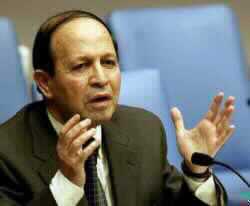- Author:
& News Agencies - Section:
WORLD HEADLINES
Iraq accepts U.N. resolution despite "bad contents"

Iraq on Wednesday accepted a new U.N. Security Council resolution, which gives Baghdad one last chance to disarm, cooperate with U.N. weapons inspectors or face "serious consequences". "We hereby inform you that we will deal with resolution 1441, despite its bad contents," said a letter from Foreign Minister Naji Sabri to U.N. Secretary-General Kofi Annan .
The eight-page letter was delivered by Iraq's U.N. ambassador, Mohammed Aldouri, in response to the council's resolution, adopted by at 15-0 vote last Friday. The Security Council had given Iraq a one-week deadline, to November 15, to accept the resolution and promise to abide by its terms.
Sabri accused the United States and Britain, co-sponsors of the resolution, of manipulating world opinion for their own aims and to help Israel, referred to as a "Zionist entity".
"The lies and manipulations of the American administration and the British government will be exposed, while the world will see how truthful and adequate the Iraqis are in what they say and do," Sabri wrote, according to an unofficial translation from the Arabic, obtained by Reuters.
Aldouri told reporters his country agreed to the measure in order to avoid a U.S.-led attack.
"This is a part of our policy that is to protect our country, to protect the nation, to protect our region also from the threat of war which is real," he said.
"We are waiting for the inspectors to go as scheduled," Aldouri said. "We are eager to see the inspectors perform their duties in accordance with international law."
An advance party of U.N. technicians is expected to go to Baghdad on Monday to prepare for inspections, not expected for another week or two. They will be accompanied by chief U.N. weapons inspector Hans Blix, and his counterpart from the International Atomic Energy Agency, Mohamed ElBaradei.
Sabri, in the letter, again denied Iraq had developed weapons of mass destruction "whether nuclear, chemical or biological as claimed by evil people".
The next step is for Iraq to submit a "full, accurate and complete" declaration within 30 days, by December 8, of all its programmes to develop and deliver dangerous weapons as well as civilian materials that could have military applications.
Sabri said Iraq would take into consideration the conduct of the inspectors, including those "ill-intentioned amongst them" to make sure they respected the country's "dignity, independence and security".
"We are eager to see them perform their duties in accordance with international law as soon as possible," Sabri said. "If they do so, professionally and lawfully, without any premeditated intentions, their lies will be exposed to public opinion."
He said the Security Council then had a duty to lift sanctions against Iraq, first imposed when Baghdad's troops invaded Kuwait in August 1990. And he noted the 1991 cease-fire resolution 687 called for the Middle East region to be free of weapons of mass destruction.
This provision should be applied to the "Zionist entity", Sabri wrote.
"The number of just people will then increase in the world and (make it) possible for Iraq to drive away the cawing of the crows of evil that daily raid its land, kill Iraqis and destroy their property by their bombs," Sabri wrote.
Iraq's acceptance came as a surprise as most council members expected Baghdad to wait until Friday. The letter arrived a day after the Iraqi parliament voted unanimously to reject the resolution and its terms.
China's deputy U.N. ambassador, Yishan Zhang, who holds this month's Security Council presidency, said the 15-member body welcomed "the correct decision of the Iraqi government".
"We want to see the resolution implemented fully and very effectively," he said.
A U.S. official, however, said: "We shouldn't make more of this than there is. This is their responsibility under the council mandate."
PHOTO CAPTION
Iraq's U.N. Ambassador Mohamed Aldouri is shown in this October file photo at U.N. headquarters in New York. REUTERS/Ray Stubblebine


 Home
Home Discover Islam
Discover Islam Quran Recitations
Quran Recitations Lectures
Lectures
 Fatwa
Fatwa Articles
Articles Fiqh
Fiqh E-Books
E-Books Boys & Girls
Boys & Girls  Articles
Articles









